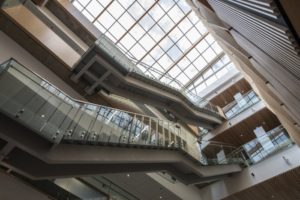As a part of an eight-month language development program carried out jointly with universities and colleges in Panama, 14 high-achieving international students have been studying at Camosun College since October.
The main goal of the Instituto para la Formación y Aprovechamiento de Recursos Humanos (IFARHU) program, says Camosun International projects and partnerships associate director Marius Langeland, is to provide skills the students can use to bolster Panama’s economy.
“There’s a lot of potential, a lot of focus on bilingual education and using English as a tool for economic prosperity,” says Langeland. “If you’re bilingual, and you pick up some of the teaching methodologies and learning strategies that we employ here in Canada, that can be very beneficial for the students back home, in bringing in a different way of learning.”

Rather than keep the students as an isolated group, Camosun has incorporated them into the English Language Development (ELD) stream. Langeland says that this creates a more holistic experience for the students who are here from Panama.
“Instead of grouping them together as one cohort with very limited interaction with other students, we decided to treat them as regular ELD students,” he says. “They absolutely love it, the opportunities this has afforded them to interact with other students.”
Panamanian student Carlos Diaz says that the opportunity to study in Canada allows him to help people who are struggling back in his own country.
“[It means a lot], not only for the impact that it’s directly having in my life as of now, but how it can also impact people from my social status, people who live nearby me,” he says. “Canada is one of the best countries in the world, and Panama not that much, so we are learning special skills, not just about the lessons that are being taught here, but also about the way it’s socially organized, the way that we can impart methodologies, and all those details will help us to be professionals who can actually have an impact on those who surround us, as of now in our communities, and in the future as well.”
Diaz wants to be an English professor, and he says that Camosun instructors have been more than happy to share their methods with him, such as setting achievable goals and understanding students’ strengths and limitations.
“Even though we all are adults, we all have some lags, as well as some extra powers, too, but being able to identify all those weaknesses and improve them, and help the students get the best out of it, are the ways that I first think that I want to implement when I get to be a professor in my country,” he says.
One unexpected aspect of the program is the opportunity to participate in cultural activities such as whale watching, which took Diaz by surprise.
“When they first told us that the university was going to be involved with all of this intercultural exchange and growing, it was just fantastic,” he says. “We went crazy, you know? For us, it was like, hey, are they really going to do this for us? They are going far and beyond for us to have the best experience possible.”
Langeland is happy with how well the students have integrated into the Camosun and Victoria communities.
“We’re incredibly lucky to have them here,” he says. “They contribute so much to the classroom and also beyond in the community.”
For Diaz and his colleagues, the experience has been one of generosity and acceptance, which will leave a lasting impact upon their lives.
“As a group, we just feel grateful, not only for the opportunity itself, which is definitely huge, but also for the way… people have treated us here,” he says. “Even when we come from not the best country, everybody has been kind and supporting with us. It’s been amazing.”
